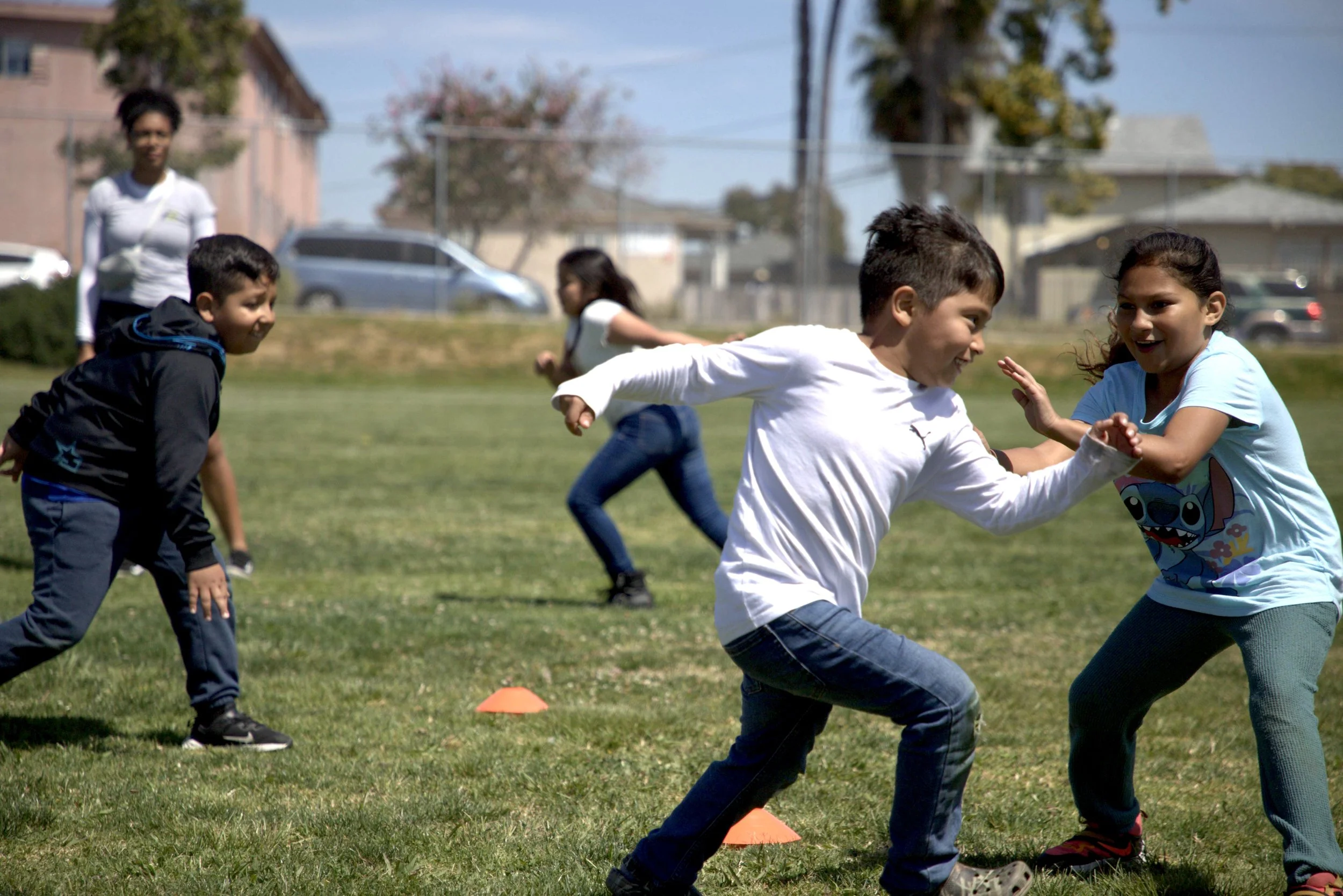
The Edge: Train the Mind Like a Muscle
8 mental performance skills, practiced under pressure, that prepare athletes to thrive in sport and life.
IA Play Built Resilience (PBR) curriculum—
an evidence-based training system developed to build self-regulation through games, challenges, and movement. Each skill is taught under stress and linked directly to real-world performance: on the field, in the classroom, and at home.
How It Works: The IA Framework
Every session follows a structured progression designed to embed skills under pressure:
Intentional Engagement
Warm Up
Athletes begin with movement, not conversation, using rhythmic activities that connect breath and body while allowing them to control intensity.
Story & Skill
Mental Tools Unlocked
Each session introduces a core mental skill through guided storytelling, making concepts like breathwork and focus relatable and real.
Infinite Game
Creative Play
Through imaginative, athlete-led games, participants build confidence, autonomy, and creative problem-solving.
Finite Game
Pressure Practice
Athletes apply their new skills in structured sports drills designed to naturally create moments of pressure and reset.
Cool Down
Meditation & Reflection
Each session ends with a calming practice that helps athletes reflect and link what they’ve learned to real-life challenges.
The 8 Core Skills
BREATHWORK
Calm the mind by controlling the body
Breath is the only automatic body function we can consciously control. We teach athletes to use specific breathing patterns to reset under stress—before a test, after conflict, or mid-game. Over time, breathwork becomes instinct, forming the foundation for all other skills.
Life Benefits: Stress management, sleep improvement, test anxiety
Sport Benefits: Pre-play reset, mistake recovery
SELF-TALK
Train your inner voice to lead, not limit
Everyone has an internal voice. We teach athletes to shape that voice into one that supports confidence and focus—especially under pressure. Using simple cue phrases, they learn to replace doubt with direction.
Life Benefits: Conflict confidence, academic resilience
Sport Benefits: Reset after mistakes, performance cues
GROWTH MINDSET
Turn failure into fuel
We show athletes how effort builds the brain. Mistakes become progress. Challenges become training. This mindset builds durable learners who bounce back stronger.
Life Benefits: Identity development, perseverance
Sport Benefits: Learning from losses, bouncing back
GOAL SETTING
Move with purpose
Athletes learn to set clear, actionable goals—then adjust as they go. It's about progress they can see and own.
Life Benefits: Academic and personal planning
Sport Benefits: Skill development, seasonal progress
ATTENTIONAL CONTROL
Focus in a world of noise
We train athletes to notice when their attention drifts and bring it back. Whether zoning in at the free-throw line or during a tough class, they learn to flex their focus like a muscle.
Life Benefits: Phone habits, screen control
Sport Benefits: Situational awareness, execution
VISUALIZATION
Mentally rehearse pressure moments
The brain reacts to imagined experience like real experience. We teach athletes to visualize key moments—before they happen. These mental reps wire confidence and poise.
Life Benefits: Presentations, exams, social settings
Sport Benefits: Clutch performance, pre-game prep
CONFIDENCE
Belief earned through mastery
Confidence comes from challenge. We give athletes hard things to overcome—then show them what they're capable of. That earned belief carries into every performance.
Life Benefits: Leadership, risk-taking
Sport Benefits: Execution under pressure
COGNITIVE REAPPRAISAL
Change the story, change the outcome
We teach athletes to reframe stress. Nerves become energy. Criticism becomes feedback. They gain power over pressure by choosing a new lens.
Life Benefits: Emotional regulation, family dynamics
Sport Benefits: Turning pressure into opportunity
Skill in Action: Self-Talk
Turn your inner voice into your greatest weapon
The Story
Athletes discover how Steve Callahan survived 76 days adrift at sea by talking himself into action—and how NFL star Aaron Donald uses self-talk to dominate every snap.
The Teaching
Introduce the “destructive spigot”—two-thirds of our thoughts are negative, automatic, and unhelpful. Athletes learn how breath interrupts this loop and how to shift from destructive chatter (“You suck”) to powerful cues (“Lock in”). They begin to separate who they are from what they think.
The Game
Penalty kicks under pressure. Athletes take shots while voicing both their inner critic and inner coach aloud—then use breath to quiet the noise and reset focus.
The Transfer
Apply the “liking effect”—how your self-talk influences how you think others see you. Most of us guess wrong. Athletes build go-to phrases that pull them to neutral in high-stakes moments: presentations, tests, conflicts, or game-deciding plays.
Who Delivers the Curriculum: Our Mental Performance Coaches
Every skill is taught in-game, under pressure, with direct coaching on how it transfers to real life.
IA’s certified Mental Performance Coaches are specialists in sport psychology who make science practical. Many hold AASP credentials and advanced degrees, but what sets them apart is how they teach—through movement, challenge, and play. They don’t talk about resilience; they help kids practice it. IA is the only organization delivering evidence-based mental performance training for mental health outcomes, and our coaches are the bridge between research and real life—mentors who help kids grow where it counts: in the heat of the moment.

